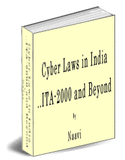Sociologists swear that a "Criminal" is not born as a Criminal. It is the society which makes a person turn disobedient in the beginning and later instill a deviant behavioural trait which can make him a criminal in due course.
TA (Transactional Analysis) specialists have also held that a person is born with a psychological frame of mind which can be best described as "I'm Not OK, You're OK" and goes through a transition "I'm OK, You're Not OK". Some stay there while a few will progress further to end up either as a mature well behaved persons with a disposition of "I'm OK, You're OK" or turn a criminally minded persons with a disposition "I'm Not OK, You're Not OK".
If therefore we try to trace the development of criminal tendencies especially of the Cyber Criminal type where mischievous young students are often involved, the educational institutions emerge as an important source.
In shaping the younger generation of our country into good citizens there is a huge responsibility for educational institutions since they influence the students during the better part of the formative years.
Naavi has already been advocating that in order not to let our Cyber trained Engineering students turn into mischievous activities that are defined as Cyber Crimes, an awareness of Cyber Law has to be built into their curriculum. He has also been advocating that IS Security as a curriculum has to incorporate Cyber law knowledge so that we develop techno-legal specialists instead of only technical experts. Even the Central Government is close to arriving at a regulation that makes it mandatory to teach Cyber Ethics as a part of Computer Education.
Two of the recent happenings in the technical education scene in India highlight the factors that contribute to the development of a Cyber Criminal tendency in our engineering colleges and we need to take a look at them.
Ragging of the IIT Delhi Student:
The first instance that I would refer to is the reported ragging of a student in Delhi IIT. While the top rank holder of the JEE was ragged so seriously as to make him run away from studies, there were many, including past IITans who said he was a coward and could not bear what they themselves had faced earlier successfully. Many of the seniors justified the ragging as necessary to teach the young entrants the way of life. (refer this NDTV discussion board extracts here)
Judging by the reactions in support of ragging, one can conclude that many IITans are silent supporters of heinous crimes in the garb of ragging which indicates a perverted mind set in a large section of our intelligent youth.
Has this tendency to rationalize ragging emanated from their own pervious experience of being ragged? ...is a question we need to ask ourselves.
If so, the authorities must have lost opportunities earlier to correct those individuals who were seething with anger within themselves when they were ragged and let them express their anger in a sadistic fashion an year later on other similar individuals.
It is this perverted yet intelligent youth who have a greater tendency to get intoxicated with the power of the Computer and turn into hackers and cyber criminals. If we need to take preventive steps to curb the growth of Cyber Crimes in educational institutions, we need to reduce the frustrations in young entrants to these colleges by stopping ragging altogether.
The second instance I would like to mention is the "Admission Trauma" that professional college entrants usually undergo which has been further exaggerated in the recent complications that has occurred in the admissions in Karnataka.
The incidents have made the students who passed out of PUC after a prolonged period of peaked motivation levels, feel that they have been tossed around by the authorities. They also feel betrayed by the cancellation of the earlier round of counselling.
These students who will fill Engineering and Medical colleges shortly in Karnataka will carry with them the conviction that the Admission Authorities, the Political Leaders , the College Managements as well as the Courts have all been insensitive to the impact of the fight between the Government and Private manaements on the student community.
This could even make these young talented persons think of revolting against the system. They are therefore prime prospects for being mislead and drawn into Cyber Criminal activities since this is the easiest means of taking revenge against the society that has frustrated them in the last six months.
With the level of frustrations that have built up in Bangalore this year, we need to recognize the possibility that the Engineering Colleges would soon turn out to be a fertile breeding ground of Cyber Criminals.
I will not be surprised if Bangalore soon turns out to be the "Cyber Naxalite Capital" along with being the IT capital of the country.
What Do we Do?
Recognizing the potential for the students who join Engineering colleges to have a latent desire to revolt and the potential for unleashing of this power when these students acquire advanced computer knowledge in the next two years, each Engineering College needs to have a programme to
a) Conduct psychological counselling for all students so that they shed their negative feelings and develop a positive motivation which has carried them so far to make them successful entrants to a professional institution.
b) Make them aware of Cyber Laws and the associated Risks.
c) Develop them into "Responsible Cyber Citizens" through an appropriate programme of induction.
I hope colleges in Bangalore develop suitable plans to achieve this objective.
Naavi
August 20,2003
For Structured Online Courses in Cyber laws, Visit Cyber Law College.com
